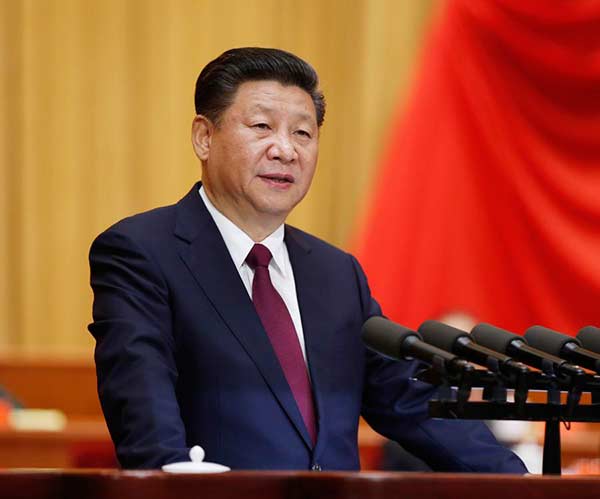80 years on, Long March legacy inspires China in transition
 0 Comment(s)
0 Comment(s) Print
Print E-mail Xinhua, October 23, 2016
E-mail Xinhua, October 23, 2016
 |
|
Chinese President Xi Jinping makes a speech at the 80th anniversary of the end of the Red Army's Long March, Beijing, Oct 21, 2016. [Photo/Xinhua] |
Zhang Xiaoping would have named his second child Changzheng (Long March) if she had been a boy.
While some 3,000 people gathered to commemorate the 80th anniversary of the Long March victory in Beijing on Friday, Zhang was celebrating the first birthday of his second daughter in Yudu County in east China's Jiangxi Province.
Yudu is where around 86,000 Red Army officers and soldiers left for the Long March in Oct 1934. Forty-seven-year old Zhang has spent almost three decades collecting and preserving Yudu's memories of the Long March.
"Initially it was a request from my father, who believed I would not be jobless because any society at any time would need curators," said Zhang, vice curator of the county's Central Red Army Long March departure museum.
"As my knowledge about the epic Long March has grown, I've become addicted." A docent earlier in his career, Zhang and his colleague searched for Long March veterans and witnesses almost every weekend.
They once visited a veteran named Yi Shijia who was almost in his 90s.
"He asked us what we think the happiest thing was for Long Marchers," Zhang recalled. "We said winning a battle, being honored, or even jumping into a pit of Moutai liquor to cure their wounds."
To their surprise, Yi's answer was this: crushing fleas they found on their clothes during a break on a sunny day.
"We never ever imagined that," he said. "The Red Army's optimism has impressed me so deeply that it changed my attitude toward life and work."
As Saturday marks the 80th anniversary of the Long March victory, China is hoping to pass on the epic expedition's legacy from generation to generation.
Zhang has asked young visitors for feedback.
"Today's younger generation is fragile under pressure and gives up more easily. However, their worries sound like nothing compared to what the Red Army soldiers suffered and overcame," he said.
Yi Tongjun, vice curator of Liping Meeting Museum, asked applicants to talk about their understanding of the spirit of the Long March during a job interview earlier this year.
"Some were stuck," said the 53-year-old. "Even some applicants with college education did not know what to say."
"Many young people take today's prosperity for granted. They don't understand how hard-won it is," he said.
The Liping Meeting occurred in Liping County of southwest China's Guizhou Province on Dec. 18, 1934. It was the first meeting by the Political Bureau of the Communist Party of China (CPC) Central Committee during the Long March, following a heavy loss in battle along Xiangjiang River in today's Guangxi Zhuang Autonomous Region. The number of Red Army soldiers had fallen sharply from 86,000 to around 30,000.
"After heated debate, the Political Bureau adopted Mao Zedong's correct proposal of marching for Zunyi in northern Guizhou," read an introduction in the Liping Meeting Museum, which described the meeting as the starting point of the Long March's triumph.
"If there had been no Liping Meeting, there would have been no Zunyi Meeting, to say nothing of the leadership of Chairman Mao," said Yi.
To Yi, the spirit of the Long March was a fortune and a source of strength.
"It has helped enhance our economy and opening up to the outside world," he said.
The spirit of the Long March, as summarized during Friday's commemoration, includes seeking truth from the facts, strict self-discipline, acknowledgement of the overall interests of the people, solidarity, and involving people from all walks of life.
Chen Yunkun, a volunteer researcher of the Long March history, interpreted "strict self-discipline" and "acknowledgement of the overall interests of the people" based on his findings over the years.
"Red Army soldiers were strictly forbidden from entering local people's bedrooms and kitchen, because the bedroom was also where all valuable things were kept, and the kitchen stored food," said Chen, also a publicity office employee at Xishui County of Zunyi City.
"The Red Army won the war by winning people's hearts," he said. "They always put people's interest first."
He said this is one of the reasons for commemorating the Long March today.
"If all the officials would bear this in mind, many so-called problems or headaches would no longer exist," said the 47-year-old researcher.
On Monday, an 8-episode TV documentary on China's latest anti-corruption campaign began airing nationwide. Some former high-ranking officials gave their confessions and reflections for the first time in public.
The documentary, masterminded by the CPC Central Commission for Discipline Inspection (CCDI), sent a strong signal of the CPC's determination to strictly govern itself and fight corruption.
The theme of the documentary echoed with what Chinese President Xi Jinping said about the Long March on Friday.
"No matter which stage our undertaking has developed to and how great the achievements we've made, we should carry forth the Long March spirit and advance in 'a new long march,'" Xi said.
Each generation has its own "long march," and they should proceed in their own way, according to Xi.
"We can never forget the Long March no matter how many achievements we've made," said Chen Yunkun about his impressions of Xi's speech.






Go to Forum >>0 Comment(s)